第三十二课 linux内核链表剖析

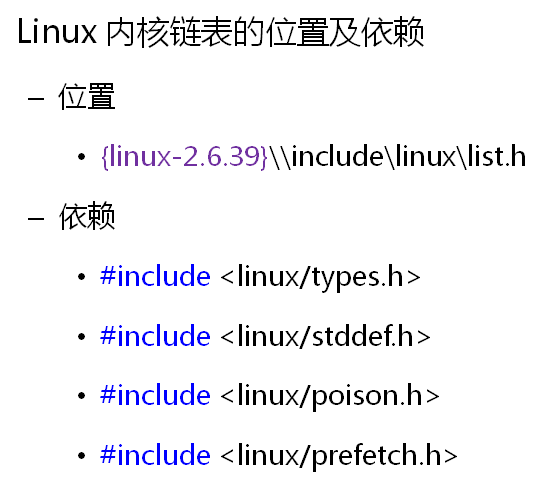
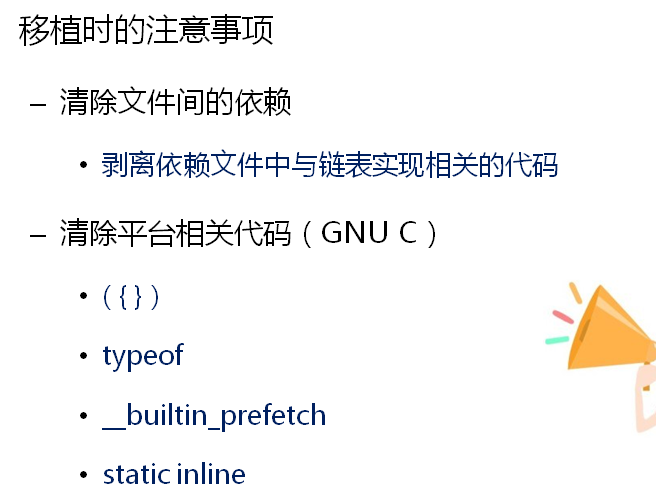
__builtin_prefetch是gcc扩展的,用来提高访问效率,需要硬件的支持。
在标准C语言中是不允许static inline联合使用的。
删除依赖的头文件,将相应的结构拷贝到LinuxList.h中:

此外,需要将container_of改写成我们自己的形式。
#define container_of(ptr, type, member) ((type *)((char *)ptr - offsetof(type,member)))
移植后的内核链表如下:
#ifndef _LINUX_LIST_H
#define _LINUX_LIST_H // #include <linux/types.h>
// #include <linux/stddef.h>
// #include <linux/poison.h>
// #include <linux/prefetch.h> #ifndef offsetof
#define offsetof(TYPE, MEMBER) ((size_t) &((TYPE *)0)->MEMBER)
#endif #ifndef container_of
#define container_of(ptr, type, member) ((type *)((char *)ptr - offsetof(type,member)))
#endif #define prefetch(x) ((void)x) #define LIST_POISON1 (NULL)
#define LIST_POISON2 (NULL) struct list_head {
struct list_head *next, *prev;
}; struct hlist_head {
struct hlist_node *first;
}; struct hlist_node {
struct hlist_node *next, **pprev;
}; /*
* Simple doubly linked list implementation.
*
* Some of the internal functions ("__xxx") are useful when
* manipulating whole lists rather than single entries, as
* sometimes we already know the next/prev entries and we can
* generate better code by using them directly rather than
* using the generic single-entry routines.
*/ #define LIST_HEAD_INIT(name) { &(name), &(name) } #define LIST_HEAD(name) \
struct list_head name = LIST_HEAD_INIT(name) static void INIT_LIST_HEAD(struct list_head *list)
{
list->next = list;
list->prev = list;
} /*
* Insert a new entry between two known consecutive entries.
*
* This is only for internal list manipulation where we know
* the prev/next entries already!
*/
#ifndef CONFIG_DEBUG_LIST
static void __list_add(struct list_head *new,
struct list_head *prev,
struct list_head *next)
{
next->prev = new;
new->next = next;
new->prev = prev;
prev->next = new;
}
#else
extern void __list_add(struct list_head *new,
struct list_head *prev,
struct list_head *next);
#endif /**
* list_add - add a new entry
* @new: new entry to be added
* @head: list head to add it after
*
* Insert a new entry after the specified head.
* This is good for implementing stacks.
*/
static void list_add(struct list_head *new, struct list_head *head)
{
__list_add(new, head, head->next);
} /**
* list_add_tail - add a new entry
* @new: new entry to be added
* @head: list head to add it before
*
* Insert a new entry before the specified head.
* This is useful for implementing queues.
*/
static void list_add_tail(struct list_head *new, struct list_head *head)
{
__list_add(new, head->prev, head);
} /*
* Delete a list entry by making the prev/next entries
* point to each other.
*
* This is only for internal list manipulation where we know
* the prev/next entries already!
*/
static void __list_del(struct list_head * prev, struct list_head * next)
{
next->prev = prev;
prev->next = next;
} /**
* list_del - deletes entry from list.
* @entry: the element to delete from the list.
* Note: list_empty() on entry does not return true after this, the entry is
* in an undefined state.
*/
#ifndef CONFIG_DEBUG_LIST
static void __list_del_entry(struct list_head *entry)
{
__list_del(entry->prev, entry->next);
} static void list_del(struct list_head *entry)
{
__list_del(entry->prev, entry->next);
entry->next = LIST_POISON1;
entry->prev = LIST_POISON2;
}
#else
extern void __list_del_entry(struct list_head *entry);
extern void list_del(struct list_head *entry);
#endif /**
* list_replace - replace old entry by new one
* @old : the element to be replaced
* @new : the new element to insert
*
* If @old was empty, it will be overwritten.
*/
static void list_replace(struct list_head *old,
struct list_head *new)
{
new->next = old->next;
new->next->prev = new;
new->prev = old->prev;
new->prev->next = new;
} static void list_replace_init(struct list_head *old,
struct list_head *new)
{
list_replace(old, new);
INIT_LIST_HEAD(old);
} /**
* list_del_init - deletes entry from list and reinitialize it.
* @entry: the element to delete from the list.
*/
static void list_del_init(struct list_head *entry)
{
__list_del_entry(entry);
INIT_LIST_HEAD(entry);
} /**
* list_move - delete from one list and add as another's head
* @list: the entry to move
* @head: the head that will precede our entry
*/
static void list_move(struct list_head *list, struct list_head *head)
{
__list_del_entry(list);
list_add(list, head);
} /**
* list_move_tail - delete from one list and add as another's tail
* @list: the entry to move
* @head: the head that will follow our entry
*/
static void list_move_tail(struct list_head *list,
struct list_head *head)
{
__list_del_entry(list);
list_add_tail(list, head);
} /**
* list_is_last - tests whether @list is the last entry in list @head
* @list: the entry to test
* @head: the head of the list
*/
static int list_is_last(const struct list_head *list,
const struct list_head *head)
{
return list->next == head;
} /**
* list_empty - tests whether a list is empty
* @head: the list to test.
*/
static int list_empty(const struct list_head *head)
{
return head->next == head;
} /**
* list_empty_careful - tests whether a list is empty and not being modified
* @head: the list to test
*
* Description:
* tests whether a list is empty _and_ checks that no other CPU might be
* in the process of modifying either member (next or prev)
*
* NOTE: using list_empty_careful() without synchronization
* can only be safe if the only activity that can happen
* to the list entry is list_del_init(). Eg. it cannot be used
* if another CPU could re-list_add() it.
*/
static int list_empty_careful(const struct list_head *head)
{
struct list_head *next = head->next;
return (next == head) && (next == head->prev);
} /**
* list_rotate_left - rotate the list to the left
* @head: the head of the list
*/
static void list_rotate_left(struct list_head *head)
{
struct list_head *first; if (!list_empty(head)) {
first = head->next;
list_move_tail(first, head);
}
} /**
* list_is_singular - tests whether a list has just one entry.
* @head: the list to test.
*/
static int list_is_singular(const struct list_head *head)
{
return !list_empty(head) && (head->next == head->prev);
} static void __list_cut_position(struct list_head *list,
struct list_head *head, struct list_head *entry)
{
struct list_head *new_first = entry->next;
list->next = head->next;
list->next->prev = list;
list->prev = entry;
entry->next = list;
head->next = new_first;
new_first->prev = head;
} /**
* list_cut_position - cut a list into two
* @list: a new list to add all removed entries
* @head: a list with entries
* @entry: an entry within head, could be the head itself
* and if so we won't cut the list
*
* This helper moves the initial part of @head, up to and
* including @entry, from @head to @list. You should
* pass on @entry an element you know is on @head. @list
* should be an empty list or a list you do not care about
* losing its data.
*
*/
static void list_cut_position(struct list_head *list,
struct list_head *head, struct list_head *entry)
{
if (list_empty(head))
return;
if (list_is_singular(head) &&
(head->next != entry && head != entry))
return;
if (entry == head)
INIT_LIST_HEAD(list);
else
__list_cut_position(list, head, entry);
} static void __list_splice(const struct list_head *list,
struct list_head *prev,
struct list_head *next)
{
struct list_head *first = list->next;
struct list_head *last = list->prev; first->prev = prev;
prev->next = first; last->next = next;
next->prev = last;
} /**
* list_splice - join two lists, this is designed for stacks
* @list: the new list to add.
* @head: the place to add it in the first list.
*/
static void list_splice(const struct list_head *list,
struct list_head *head)
{
if (!list_empty(list))
__list_splice(list, head, head->next);
} /**
* list_splice_tail - join two lists, each list being a queue
* @list: the new list to add.
* @head: the place to add it in the first list.
*/
static void list_splice_tail(struct list_head *list,
struct list_head *head)
{
if (!list_empty(list))
__list_splice(list, head->prev, head);
} /**
* list_splice_init - join two lists and reinitialise the emptied list.
* @list: the new list to add.
* @head: the place to add it in the first list.
*
* The list at @list is reinitialised
*/
static void list_splice_init(struct list_head *list,
struct list_head *head)
{
if (!list_empty(list)) {
__list_splice(list, head, head->next);
INIT_LIST_HEAD(list);
}
} /**
* list_splice_tail_init - join two lists and reinitialise the emptied list
* @list: the new list to add.
* @head: the place to add it in the first list.
*
* Each of the lists is a queue.
* The list at @list is reinitialised
*/
static void list_splice_tail_init(struct list_head *list,
struct list_head *head)
{
if (!list_empty(list)) {
__list_splice(list, head->prev, head);
INIT_LIST_HEAD(list);
}
} /**
* list_entry - get the struct for this entry
* @ptr: the &struct list_head pointer.
* @type: the type of the struct this is embedded in.
* @member: the name of the list_struct within the struct.
*/
#define list_entry(ptr, type, member) \
container_of(ptr, type, member) /**
* list_first_entry - get the first element from a list
* @ptr: the list head to take the element from.
* @type: the type of the struct this is embedded in.
* @member: the name of the list_struct within the struct.
*
* Note, that list is expected to be not empty.
*/
#define list_first_entry(ptr, type, member) \
list_entry((ptr)->next, type, member) /**
* list_for_each - iterate over a list
* @pos: the &struct list_head to use as a loop cursor.
* @head: the head for your list.
*/
#define list_for_each(pos, head) \
for (pos = (head)->next; prefetch(pos->next), pos != (head); \
pos = pos->next) /**
* __list_for_each - iterate over a list
* @pos: the &struct list_head to use as a loop cursor.
* @head: the head for your list.
*
* This variant differs from list_for_each() in that it's the
* simplest possible list iteration code, no prefetching is done.
* Use this for code that knows the list to be very short (empty
* or 1 entry) most of the time.
*/
#define __list_for_each(pos, head) \
for (pos = (head)->next; pos != (head); pos = pos->next) /**
* list_for_each_prev - iterate over a list backwards
* @pos: the &struct list_head to use as a loop cursor.
* @head: the head for your list.
*/
#define list_for_each_prev(pos, head) \
for (pos = (head)->prev; prefetch(pos->prev), pos != (head); \
pos = pos->prev) /**
* list_for_each_safe - iterate over a list safe against removal of list entry
* @pos: the &struct list_head to use as a loop cursor.
* @n: another &struct list_head to use as temporary storage
* @head: the head for your list.
*/
#define list_for_each_safe(pos, n, head) \
for (pos = (head)->next, n = pos->next; pos != (head); \
pos = n, n = pos->next) /**
* list_for_each_prev_safe - iterate over a list backwards safe against removal of list entry
* @pos: the &struct list_head to use as a loop cursor.
* @n: another &struct list_head to use as temporary storage
* @head: the head for your list.
*/
#define list_for_each_prev_safe(pos, n, head) \
for (pos = (head)->prev, n = pos->prev; \
prefetch(pos->prev), pos != (head); \
pos = n, n = pos->prev) /**
* list_for_each_entry - iterate over list of given type
* @pos: the type * to use as a loop cursor.
* @head: the head for your list.
* @member: the name of the list_struct within the struct.
*/
#define list_for_each_entry(pos, head, member) \
for (pos = list_entry((head)->next, typeof(*pos), member); \
prefetch(pos->member.next), &pos->member != (head); \
pos = list_entry(pos->member.next, typeof(*pos), member)) /**
* list_for_each_entry_reverse - iterate backwards over list of given type.
* @pos: the type * to use as a loop cursor.
* @head: the head for your list.
* @member: the name of the list_struct within the struct.
*/
#define list_for_each_entry_reverse(pos, head, member) \
for (pos = list_entry((head)->prev, typeof(*pos), member); \
prefetch(pos->member.prev), &pos->member != (head); \
pos = list_entry(pos->member.prev, typeof(*pos), member)) /**
* list_prepare_entry - prepare a pos entry for use in list_for_each_entry_continue()
* @pos: the type * to use as a start point
* @head: the head of the list
* @member: the name of the list_struct within the struct.
*
* Prepares a pos entry for use as a start point in list_for_each_entry_continue().
*/
#define list_prepare_entry(pos, head, member) \
((pos) ? : list_entry(head, typeof(*pos), member)) /**
* list_for_each_entry_continue - continue iteration over list of given type
* @pos: the type * to use as a loop cursor.
* @head: the head for your list.
* @member: the name of the list_struct within the struct.
*
* Continue to iterate over list of given type, continuing after
* the current position.
*/
#define list_for_each_entry_continue(pos, head, member) \
for (pos = list_entry(pos->member.next, typeof(*pos), member); \
prefetch(pos->member.next), &pos->member != (head); \
pos = list_entry(pos->member.next, typeof(*pos), member)) /**
* list_for_each_entry_continue_reverse - iterate backwards from the given point
* @pos: the type * to use as a loop cursor.
* @head: the head for your list.
* @member: the name of the list_struct within the struct.
*
* Start to iterate over list of given type backwards, continuing after
* the current position.
*/
#define list_for_each_entry_continue_reverse(pos, head, member) \
for (pos = list_entry(pos->member.prev, typeof(*pos), member); \
prefetch(pos->member.prev), &pos->member != (head); \
pos = list_entry(pos->member.prev, typeof(*pos), member)) /**
* list_for_each_entry_from - iterate over list of given type from the current point
* @pos: the type * to use as a loop cursor.
* @head: the head for your list.
* @member: the name of the list_struct within the struct.
*
* Iterate over list of given type, continuing from current position.
*/
#define list_for_each_entry_from(pos, head, member) \
for (; prefetch(pos->member.next), &pos->member != (head); \
pos = list_entry(pos->member.next, typeof(*pos), member)) /**
* list_for_each_entry_safe - iterate over list of given type safe against removal of list entry
* @pos: the type * to use as a loop cursor.
* @n: another type * to use as temporary storage
* @head: the head for your list.
* @member: the name of the list_struct within the struct.
*/
#define list_for_each_entry_safe(pos, n, head, member) \
for (pos = list_entry((head)->next, typeof(*pos), member), \
n = list_entry(pos->member.next, typeof(*pos), member); \
&pos->member != (head); \
pos = n, n = list_entry(n->member.next, typeof(*n), member)) /**
* list_for_each_entry_safe_continue - continue list iteration safe against removal
* @pos: the type * to use as a loop cursor.
* @n: another type * to use as temporary storage
* @head: the head for your list.
* @member: the name of the list_struct within the struct.
*
* Iterate over list of given type, continuing after current point,
* safe against removal of list entry.
*/
#define list_for_each_entry_safe_continue(pos, n, head, member) \
for (pos = list_entry(pos->member.next, typeof(*pos), member), \
n = list_entry(pos->member.next, typeof(*pos), member); \
&pos->member != (head); \
pos = n, n = list_entry(n->member.next, typeof(*n), member)) /**
* list_for_each_entry_safe_from - iterate over list from current point safe against removal
* @pos: the type * to use as a loop cursor.
* @n: another type * to use as temporary storage
* @head: the head for your list.
* @member: the name of the list_struct within the struct.
*
* Iterate over list of given type from current point, safe against
* removal of list entry.
*/
#define list_for_each_entry_safe_from(pos, n, head, member) \
for (n = list_entry(pos->member.next, typeof(*pos), member); \
&pos->member != (head); \
pos = n, n = list_entry(n->member.next, typeof(*n), member)) /**
* list_for_each_entry_safe_reverse - iterate backwards over list safe against removal
* @pos: the type * to use as a loop cursor.
* @n: another type * to use as temporary storage
* @head: the head for your list.
* @member: the name of the list_struct within the struct.
*
* Iterate backwards over list of given type, safe against removal
* of list entry.
*/
#define list_for_each_entry_safe_reverse(pos, n, head, member) \
for (pos = list_entry((head)->prev, typeof(*pos), member), \
n = list_entry(pos->member.prev, typeof(*pos), member); \
&pos->member != (head); \
pos = n, n = list_entry(n->member.prev, typeof(*n), member)) /**
* list_safe_reset_next - reset a stale list_for_each_entry_safe loop
* @pos: the loop cursor used in the list_for_each_entry_safe loop
* @n: temporary storage used in list_for_each_entry_safe
* @member: the name of the list_struct within the struct.
*
* list_safe_reset_next is not safe to use in general if the list may be
* modified concurrently (eg. the lock is dropped in the loop body). An
* exception to this is if the cursor element (pos) is pinned in the list,
* and list_safe_reset_next is called after re-taking the lock and before
* completing the current iteration of the loop body.
*/
#define list_safe_reset_next(pos, n, member) \
n = list_entry(pos->member.next, typeof(*pos), member) /*
* Double linked lists with a single pointer list head.
* Mostly useful for hash tables where the two pointer list head is
* too wasteful.
* You lose the ability to access the tail in O(1).
*/ #define HLIST_HEAD_INIT { .first = NULL }
#define HLIST_HEAD(name) struct hlist_head name = { .first = NULL }
#define INIT_HLIST_HEAD(ptr) ((ptr)->first = NULL)
static void INIT_HLIST_NODE(struct hlist_node *h)
{
h->next = NULL;
h->pprev = NULL;
} static int hlist_unhashed(const struct hlist_node *h)
{
return !h->pprev;
} static int hlist_empty(const struct hlist_head *h)
{
return !h->first;
} static void __hlist_del(struct hlist_node *n)
{
struct hlist_node *next = n->next;
struct hlist_node **pprev = n->pprev;
*pprev = next;
if (next)
next->pprev = pprev;
} static void hlist_del(struct hlist_node *n)
{
__hlist_del(n);
n->next = LIST_POISON1;
n->pprev = LIST_POISON2;
} static void hlist_del_init(struct hlist_node *n)
{
if (!hlist_unhashed(n)) {
__hlist_del(n);
INIT_HLIST_NODE(n);
}
} static void hlist_add_head(struct hlist_node *n, struct hlist_head *h)
{
struct hlist_node *first = h->first;
n->next = first;
if (first)
first->pprev = &n->next;
h->first = n;
n->pprev = &h->first;
} /* next must be != NULL */
static void hlist_add_before(struct hlist_node *n,
struct hlist_node *next)
{
n->pprev = next->pprev;
n->next = next;
next->pprev = &n->next;
*(n->pprev) = n;
} static void hlist_add_after(struct hlist_node *n,
struct hlist_node *next)
{
next->next = n->next;
n->next = next;
next->pprev = &n->next; if(next->next)
next->next->pprev = &next->next;
} /* after that we'll appear to be on some hlist and hlist_del will work */
static void hlist_add_fake(struct hlist_node *n)
{
n->pprev = &n->next;
} /*
* Move a list from one list head to another. Fixup the pprev
* reference of the first entry if it exists.
*/
static void hlist_move_list(struct hlist_head *old,
struct hlist_head *new)
{
new->first = old->first;
if (new->first)
new->first->pprev = &new->first;
old->first = NULL;
} #define hlist_entry(ptr, type, member) container_of(ptr,type,member) #define hlist_for_each(pos, head) \
for (pos = (head)->first; pos && ({ prefetch(pos->next); ; }); \
pos = pos->next) #define hlist_for_each_safe(pos, n, head) \
for (pos = (head)->first; pos && ({ n = pos->next; ; }); \
pos = n) /**
* hlist_for_each_entry - iterate over list of given type
* @tpos: the type * to use as a loop cursor.
* @pos: the &struct hlist_node to use as a loop cursor.
* @head: the head for your list.
* @member: the name of the hlist_node within the struct.
*/
#define hlist_for_each_entry(tpos, pos, head, member) \
for (pos = (head)->first; \
pos && ({ prefetch(pos->next); ;}) && \
({ tpos = hlist_entry(pos, typeof(*tpos), member); ;}); \
pos = pos->next) /**
* hlist_for_each_entry_continue - iterate over a hlist continuing after current point
* @tpos: the type * to use as a loop cursor.
* @pos: the &struct hlist_node to use as a loop cursor.
* @member: the name of the hlist_node within the struct.
*/
#define hlist_for_each_entry_continue(tpos, pos, member) \
for (pos = (pos)->next; \
pos && ({ prefetch(pos->next); ;}) && \
({ tpos = hlist_entry(pos, typeof(*tpos), member); ;}); \
pos = pos->next) /**
* hlist_for_each_entry_from - iterate over a hlist continuing from current point
* @tpos: the type * to use as a loop cursor.
* @pos: the &struct hlist_node to use as a loop cursor.
* @member: the name of the hlist_node within the struct.
*/
#define hlist_for_each_entry_from(tpos, pos, member) \
for (; pos && ({ prefetch(pos->next); ;}) && \
({ tpos = hlist_entry(pos, typeof(*tpos), member); ;}); \
pos = pos->next) /**
* hlist_for_each_entry_safe - iterate over list of given type safe against removal of list entry
* @tpos: the type * to use as a loop cursor.
* @pos: the &struct hlist_node to use as a loop cursor.
* @n: another &struct hlist_node to use as temporary storage
* @head: the head for your list.
* @member: the name of the hlist_node within the struct.
*/
#define hlist_for_each_entry_safe(tpos, pos, n, head, member) \
for (pos = (head)->first; \
pos && ({ n = pos->next; ; }) && \
({ tpos = hlist_entry(pos, typeof(*tpos), member); ;}); \
pos = n) #endif
这个文件在linux内核中是list.h文件。
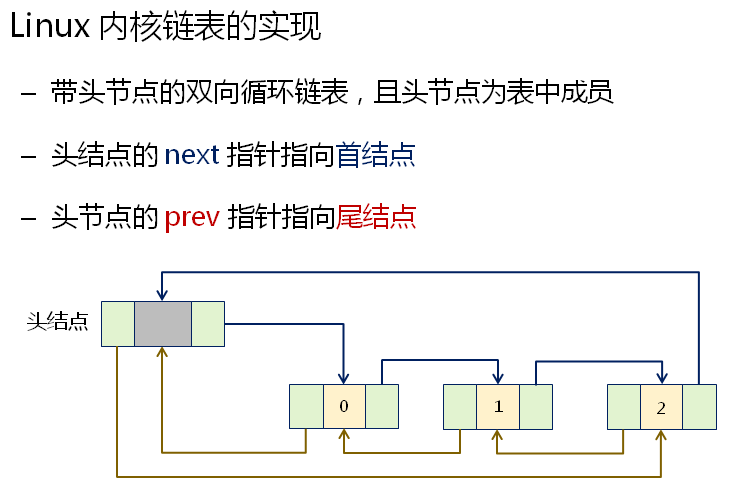
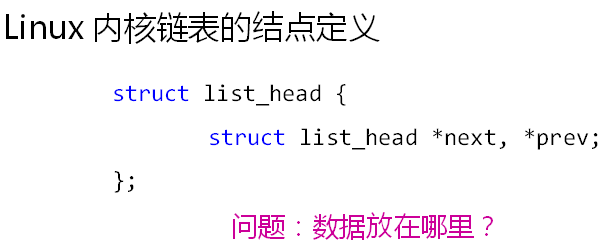
数据由使用链表的人来定义。
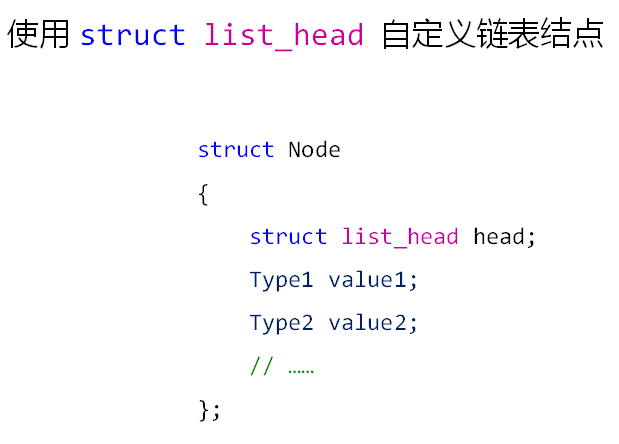
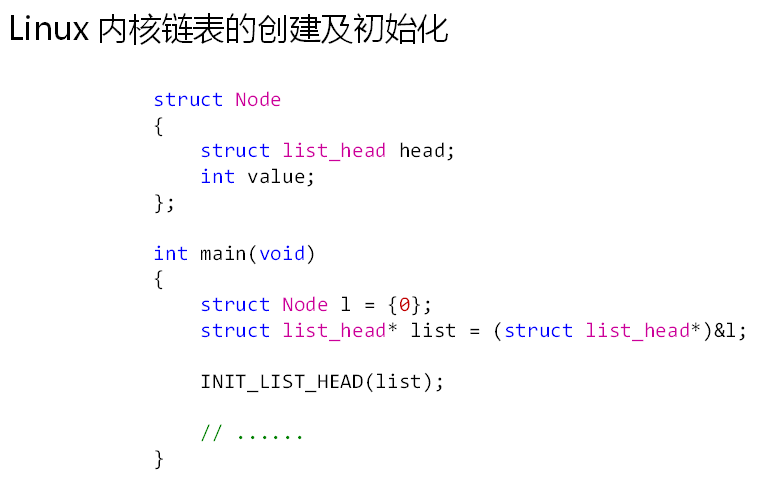
上图中的l为头结点,类型转换后list指向了l中的head。
INIT_LIST_HEAD在初始化头结点的时候让自己形成了双向循环链表。
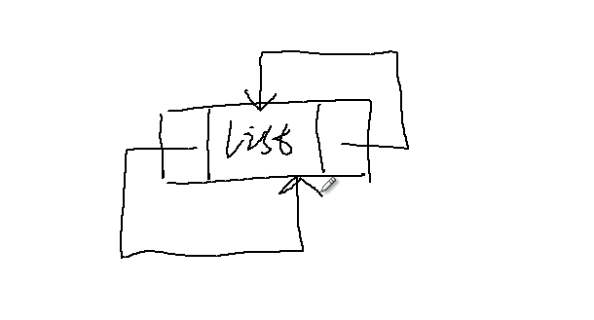
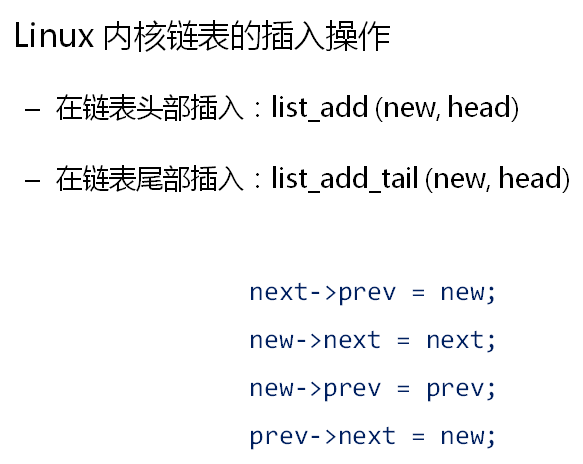
list_add图解:

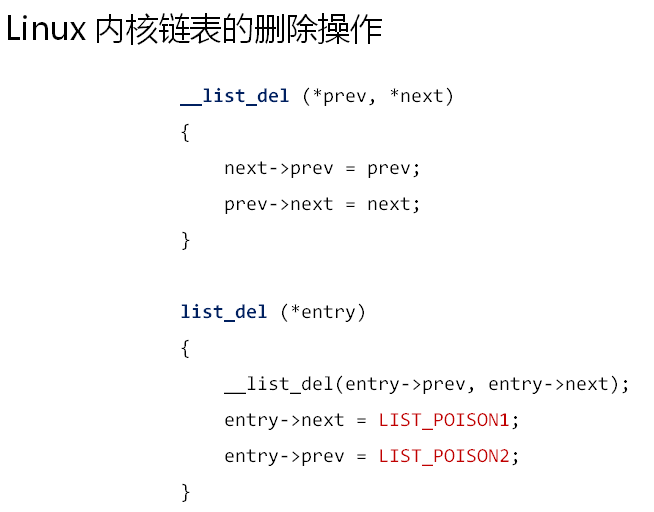
删除操作图解:
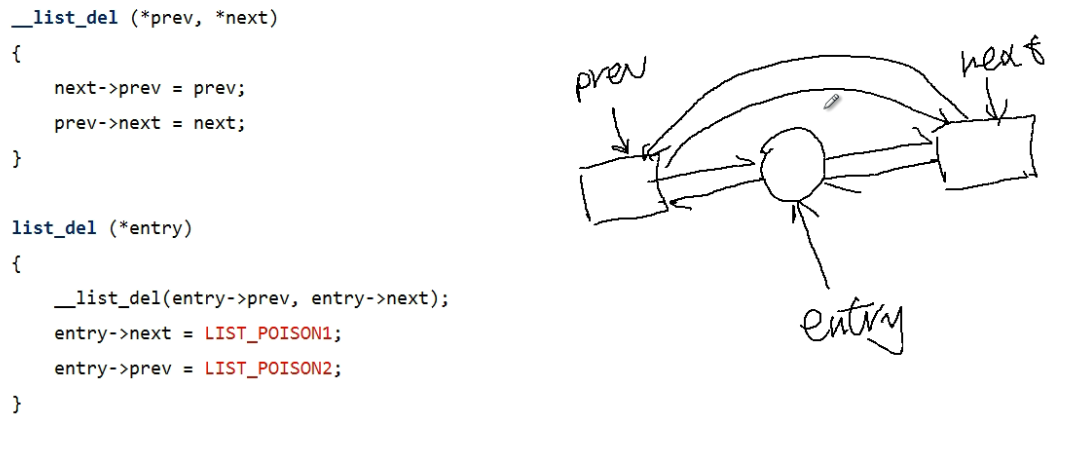
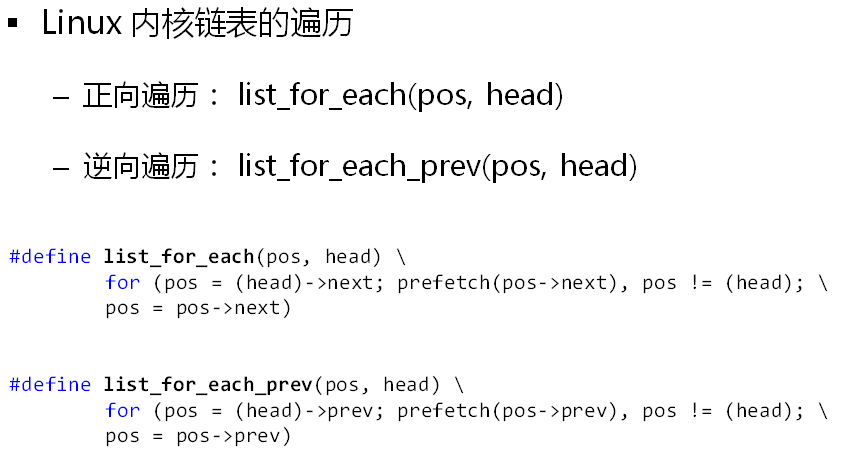
遍历就是一个for循环,prefetch是gcc内置的宏,为了提高效率,移植之后,我们用不到。
测试程序如下:
#include <stdio.h>
#include "LinuxList.h" void list_demo_1()
{
struct Node
{
struct list_head head;
int value;
}; struct Node l = {};
struct list_head* list = (struct list_head*)&l;
struct list_head* slider = NULL;
int i = ; INIT_LIST_HEAD(list); printf("Insert begin ...\n"); for(i=; i<; i++)
{
struct Node* n = (struct Node*)malloc(sizeof(struct Node)); n->value = i; list_add_tail((struct list_head*)n, list);
} list_for_each(slider, list)
{
printf("%d\n", ((struct Node*)slider)->value);
} printf("Insert end ...\n"); printf("Delete begin ...\n"); list_for_each(slider, list)
{
if( ((struct Node*)slider)->value == )
{
list_del(slider);
free(slider);
break;
}
} list_for_each(slider, list)
{
printf("%d\n", ((struct Node*)slider)->value);
} printf("Delete end ...\n");
} int main()
{
list_demo_1(); return ;
}
结果如下:
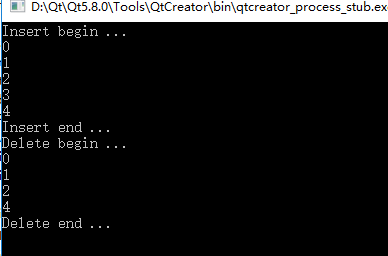
上面的程序中链表结构在我们的结构的开头处,所以类似于32行的强制类型转换可以直接用,这是没有问题的,但是如果我们的自定义数据在开头处呢,这就不能用强制类型转换了。
示例:
#include <stdio.h>
#include "LinuxList.h" void list_demo_1()
{
struct Node
{
struct list_head head;
int value;
}; struct Node l = {};
struct list_head* list = (struct list_head*)&l;
struct list_head* slider = NULL;
int i = ; INIT_LIST_HEAD(list); printf("Insert begin ...\n"); for(i=; i<; i++)
{
struct Node* n = (struct Node*)malloc(sizeof(struct Node)); n->value = i; list_add_tail((struct list_head*)n, list);
} list_for_each(slider, list)
{
printf("%d\n", ((struct Node*)slider)->value);
} printf("Insert end ...\n"); printf("Delete begin ...\n"); list_for_each(slider, list)
{
if( ((struct Node*)slider)->value == )
{
list_del(slider);
free(slider);
break;
}
} list_for_each(slider, list)
{
printf("%d\n", ((struct Node*)slider)->value);
} printf("Delete end ...\n");
} void list_demo_2()
{
struct Node
{
int value;
struct list_head head;
}; struct Node l = {};
struct list_head* list = &l.head;
struct list_head* slider = NULL;
int i = ; INIT_LIST_HEAD(list); printf("Insert begin ...\n"); for(i=; i<; i++)
{
struct Node* n = (struct Node*)malloc(sizeof(struct Node)); n->value = i; list_add(&n->head, list);
} list_for_each(slider, list)
{
printf("%d\n", list_entry(slider, struct Node, head)->value);
} printf("Insert end ...\n"); printf("Delete begin ...\n"); list_for_each(slider, list)
{
struct Node* n = list_entry(slider, struct Node, head); if( n->value == )
{
list_del(slider);
free(n);
break;
}
} list_for_each(slider, list)
{
printf("%d\n", list_entry(slider, struct Node, head)->value);
} printf("Delete end ...\n");
} int main()
{
list_demo_1(); list_demo_2(); return ;
}
在demo2中,我们没有用强制类型转换(这时也不能使用强制类型转换),而是使用了list_entry,这个宏内部使用了container_of。使用list_entry之后就能得到我们自定义的节点的指针了。
运行结果如下:
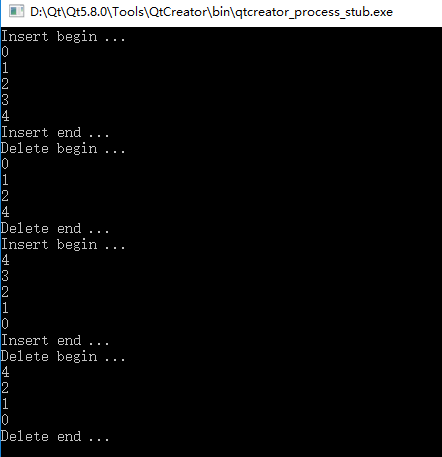
小结:
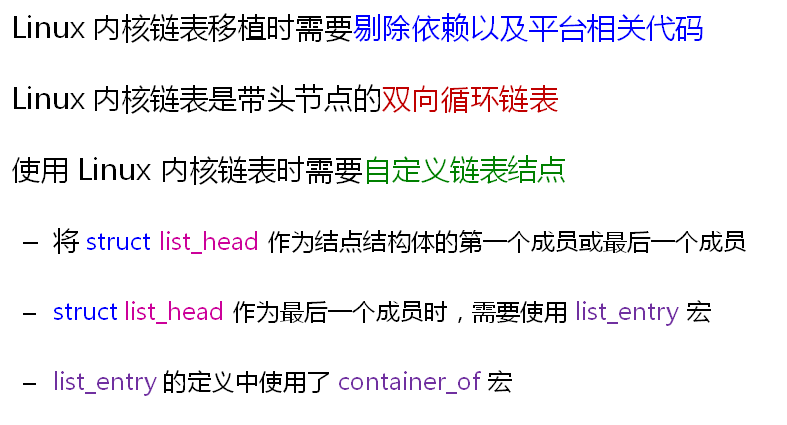
第三十二课 linux内核链表剖析的更多相关文章
- 第32课 Linux内核链表剖析
1. Linux内核链表的位置及依赖 (1)位置:{linux-2.6.39}\\include\linux\list.h (2)依赖 ①#include<linux\types.h> ② ...
- NeHe OpenGL教程 第三十二课:拾取游戏
转自[翻译]NeHe OpenGL 教程 前言 声明,此 NeHe OpenGL教程系列文章由51博客yarin翻译(2010-08-19),本博客为转载并稍加整理与修改.对NeHe的OpenGL管线 ...
- linux内核链表剖析
1.移植linux内核链表,使其适用于非GNU编译器 2.分析linux内核中链表的基本实现 移植时的注意事项 清除文件间的依赖 剥离依赖文件中与链表实现相关的代码 清除平台相关的代码(GNU C) ...
- 第三十二章 Linux常规练习题(一)
一.练习题一 1.超级用户(管理员用户)提示符是____,普通用户提示符是____.2.linux关机重启的命令有哪些 ?3.bash是什么?4.bash特性, 常见的bash特性有哪些?5.网卡的配 ...
- 第三十二课:JSDeferred的性能提速
大家如果看了前面两课,就知道Deferred的静态方法next(next_default)是用setTimeout实现的(有浏览器最小时钟间隔).但是实现这种异步操作,可以有很多种方法.JSDefer ...
- 三十二、Linux 进程与信号——不可靠信号
32.1 不可靠信号问题 发生信号时关联动作被重置为默认设置 信号可能丢失 程序片段 在进入 sig_int 与再次调用 signal 之间发生的 SIGINT 信号将不会捕获 导致进程终止 以前版本 ...
- python第三十二课——队列
队列:满足特点 --> 先进先出,类似于我们生活中的买票.安检 [注意] 对于队列而言:python中有为其封装特定的函数,在collections模块中的deque函数就可以获取一个队列对象; ...
- 潭州课堂25班:Ph201805201 django 项目 第三十二课 后台站点管理(课堂笔记)
一.后台站点模版抽取 1.获取静态站点模版 可以使用git clone到本地 git clone https://github.com/almasaeed2010/AdminLTE.git 也可以在g ...
- python第三十二课——栈
栈:满足特点 --> 先进后出,类似于我们生活中的子弹夹 [注意] 对于栈结构而言:python中没有为其封装特定的函数,我们可以使用list(列表)来模拟栈的特点 使用list对象来模拟栈结构 ...
随机推荐
- logstash快速入门
转自 http://blog.csdn.net/wp500/article/details/41040213 原文地址:http://logstash.net/docs/1.4.2/tutorials ...
- 配置tomcat允许跨域访问,cors跨域资源共享
1.导入cors-filter-1.7.jar,java-property-utils-1.9.jar两个jar包 2.在web.xml里配上: <filter> <filter-n ...
- 三大平衡树(Treap + Splay + SBT)总结+模板[转]
Treap树 核心是 利用随机数的二叉排序树的各种操作复杂度平均为O(lgn) Treap模板: #include <cstdio> #include <cstring> #i ...
- 手机验证码JQUERY实现
<!DOCTYPE html> <html> <head> <script src="http://libs.baidu.com/jquery/1. ...
- windows启动/禁用telnet/IIS/ftp/IE等服务
将需要启动的钩选,将要禁用的取消钩选确定即可:比如我这里要启动telnet客户端. 启动IIS将IIS可承载的Web核心和Internet两大项全钩选上即可,钩多了不影响功能.
- composer install Your requirements could not be resolved to an installable set of packages
composer install --ignore-platform-reqs 或者 composer update --ignore-platform-reqs
- Linux第九周作业
学习笔记 不同类型的进程有不同的调度需求,其中分为两类 第一类:I/O-bound(频繁进行I/O,花费长时间等待I/O操作的完成)CPU-bound(计算密集型,需要大量的CPU时间进行运算) 第二 ...
- Win10系列:JavaScript动画3
"交叉进出"动画也是Windows动画库中的动画效果."交叉进出"动画的动画效果是在应用程序界面上隐藏一个元素并同时在相同位置显示另一个元素的时候,被隐藏的元素 ...
- tomcat vue webpack vue-router 404
社区已经有结局方案了, http://blog.csdn.net/hayre/article/details/70145513
- Kafka.net使用编程入门(三)
这个世界既不是有钱人的世界,也不是有权人的世界,它是有心人的世界. 一些有用的命令 1.列出主题:kafka-topics.bat --list --zookeeper localhost:2181 ...
